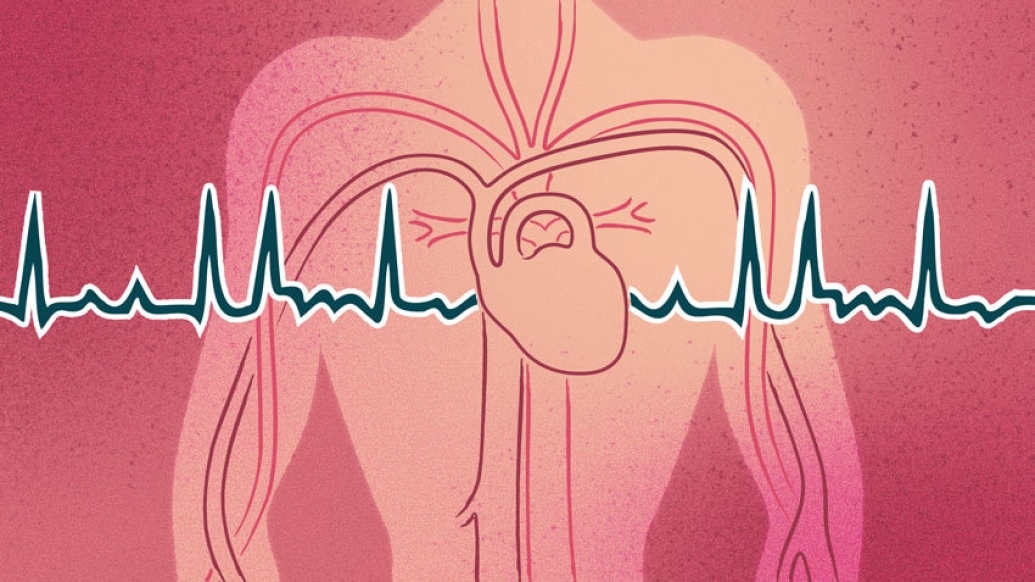An expert weighs in on what to avoid to prevent an atrial fibrillation episode.
5:00 AM
Author |

Everyone knows the benefits of a good night's sleep — and the downfalls of not getting enough.
But did you know that poor sleep quality is one of the many triggers of a heart rhythm condition known as atrial fibrillation?
According to University of Michigan Health electrophysiologist Michael Ghannam, M.D., many of his patients aren't aware of the connection between atrial fibrillation and poor sleep, often caused by conditions such as sleep apnea.
Atrial fibrillation, or Afib, is one of the most common types of heart rhythm conditions. During Afib, the top chambers of the heart beat in an irregular rhythm, out of sync with the heart's lower chambers. While some individuals experience no symptoms at all, others my experience a fluttering or pounding heartbeat along with chest pain, weakness, fatigue, dizziness and shortness of breath. Afib can also lead to stroke.
Afib has a variety of causes, including:
-
Heart disease
-
Chronic conditions such as diabetes and asthma
-
Family history
-
High blood pressure
-
Sedentary lifestyle
-
Obesity
7 common Afib triggers
"But poor sleep is just one of many triggers for Afib," said Ghannam, noting alcohol, excessive exercise, dehydration, stress and consuming large meals as some of the more common ones. "It just depends on the individual and his or her experience."
1. Sleep issues
Poor quality sleep, often caused by a condition known as sleep apnea, can result episodes of atrial fibrillation. Even small interruptions in an individual's sleep quality and duration can increase the risk of atrial fibrillation by as much as 18%, and those who experience insomnia are up to 40% more likely to develop Afib.
"I recommend my patients see a sleep specialist for a formal evaluation to determine if they need a sleep study," said Ghannam. "If they're diagnosed with sleep apnea, they are highly encouraged to get it treated."
2. Alcohol
Consuming alcohol, especially binge drinking, can weaken the heart muscle, making it more difficult to pump blood to the rest of the body. This, in turn, makes the heart more susceptible to episodes of Afib. Alcohol consumption can also result in dehydration, another common trigger for Afib.
3. Caffeine
As a powerful stimulant, caffeine has been identified as an Afib trigger for some individuals. However, several clinical studies indicate caffeine has no, or minimal, impact on those with Afib.
"For most patients, a small amount of caffeine is not going to trigger an episode of atrial fibrillation," said Ghannam.
4. Excessive exercise
Working out makes the heart beat faster, so for some Afib patients, a quick burst of exercise is capable of triggering an episode. Overall, says Ghannam, Afib events are likely to happen during extreme levels of exercise or exercising when you're dehydrated.
5. Dehydration
Whether from consuming excess caffeine or alcohol or a lack of water, dehydration is a very common trigger for atrial fibrillation. Caffeine and alcohol are powerful diuretics, which means if a person doesn't drink enough supplemental water, they can become dehydrated, which can lead to episodes of atrial fibrillation.
6. Stress
Any type of stress can cause episodes of atrial fibrillation. Periods of stress can result in the release of stress-related hormones that can trigger Afib. Furthermore, individuals under stress may tend to have sleep issues, consume more caffeine or drink more alcohol – habits that together can lead to an Afib event.
7. Large meals
For some individuals, consuming a large meal can cause gastrointestinal problems. These, in turn, can stimulate the vagus nerve, which connects the gut, brain and heart. A spike in the vagus nerve from eating a large meal can spark an Afib event. Research shows that when gastrointestinal issues resolve, Afib episodes typically subside.
No matter what triggers the condition, treatment for atrial fibrillation depends on a patient's preference, says Ghannam.
"We always encourage lifestyle changes, and there are medications to control the heart rhythm or ablation procedures that use radiofrequency energy to stop the 'short circuits' that are triggering Afib. We discuss all options with our patients.
"If we can identify a patient with Afib, we can do what it takes to help keep them in the right heart rhythm. We can manage their condition."
Avoiding Afib triggers
Because Afib triggers are so nuanced, Ghannam recommends his patients be vigilant about their symptoms.
"We tell our patient's that it's up to them to identify what triggers their atrial fibrillation. We encourage them to keep a symptom log to help them keep track." There's also wearable technology that helps monitor triggers with more accuracy as patients may forget exactly what caused a recent heart rhythm issue, he says.
Despite the many things that might lead to an Afib episode, Ghannam's advice to patients is consistent: "Adhere to a heart healthy lifestyle, including limited alcohol, no smoking, a healthy diet and well-controlled blood pressure, diabetes and weight management."
And, of course, get good sleep to protect your heart not only from Afib but from other cardiovascular issues associated with poor sleep hygiene. Overall, Ghannam says, sleep quality is important, along with a heart healthy lifestyle, which can't be overestimated. "It's all wrapped together."

Explore a variety of health care news & stories by visiting the Health Lab home page for more articles.

Department of Communication at Michigan Medicine
Want top health & research news weekly? Sign up for Health Lab’s newsletters today!





